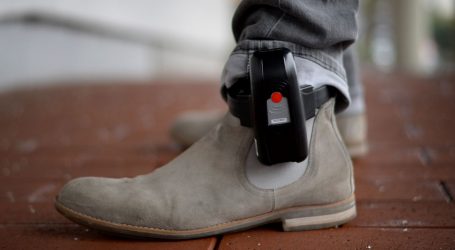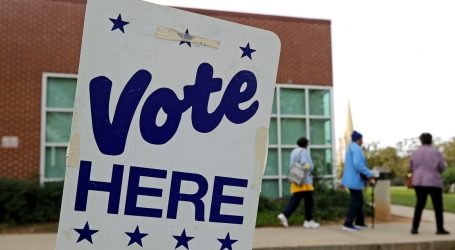Columbia Journalism Review’s Big Fail: It Published 24,000 Words on Russiagate and Missed the Point
Mother Jones illustration; AP
Fight disinformation: Sign up for the free Mother Jones Daily newsletter and follow the news that matters.Misdirection, an essential tool for magicians, is not usually a component of media criticism. But in a lengthy critique of the coverage of the Trump-Russia scandal published this week by the Columbia Journalism Review, veteran investigative reporter Jeff Gerth deflects attention from the core components of Russiagate, mirroring Donald Trump’s own efforts of the past six years to escape accountability for his profound betrayal of the nation. Though Gerth’s target is media outlets, particularly the New York Times (where he worked for 29 years), Gerth ends up bolstering Trump’s phony narrative that there was no Russia scandal, just merely a hoax whipped up by reckless reporters and Trump’s enemies in the press, with the assistance of the Deep State.
In a massive 24,000-word, four-part article, Gerth dissects how the Times, the Washington Post, CNN, and other news organizations during the 2016 election and afterward reported on Trump’s and his campaign’s interactions with Russia. (He briefly references, without criticism, the story I published that first revealed the existence of the dossier compiled by former British intelligence officer Christopher Steele and that reported that the FBI was investigating its allegations.) Gerth does probe genuine errors committed by his former employer and others. The Times, for instance, reported shortly before the 2016 election that the FBI’s investigation had found no link between Trump and Russia, when the bureau had barely begun its inquiry and had reached no final conclusions. And after the election, the Times produced a report in early 2017 that seemingly went too far in the opposite direction when it reported that US intelligence had evidence that “Donald J. Trump’s 2016 presidential campaign and other Trump associates had repeated contacts with senior Russian intelligence officials in the year before the election.” (Trump’s campaign chair, Paul Manafort, we later learned, had been huddling with a suspected Russian intelligence official during the campaign, but FBI officials handling the Russian investigation at the time saw this Times article as going too far.)
Gerth finds plenty of ammo for his assault on the media. But here’s where he goes wrong: He misrepresents the scandal that is the subject of the media coverage he is scrutinizing. He defines the Trump-Russia affair by only two elements of the tale: the question of Trump collusion with Moscow and the unconfirmed Steele dossier. This is exactly how Trump and his lieutenants want the scandal to be perceived. From the start, Trump has proclaimed “no collusion,” setting that as the bar for judging him. That is, no evidence of criminal collusion, and he’s scot-free. And he and his defenders have fixated on the Steele dossier—often falsely claiming it triggered the FBI’s investigation—to portray Trump as the victim of untrue allegations and “fake news.” Gerth essentially accepts these terms of the debate.
Yet the focus on collusion and the Steele material has been a purposeful distraction meant to obscure the basics of the scandal: Vladimir Putin attacked the 2016 election in part to help Trump win, and Trump and his aides aided and abetted this assault on American democracy by denying such an attack was happening. Trump provided cover for a foreign adversary subverting a US election. Throughout the thousands and thousands of words Gerth generates, he downplays or ignores these fundamentals and how the media in 2016 covered them (which was shoddily). Instead, he zeroes in on the reporting related to collusion and Steele. In doing so, he offers an examination predicated on a skewed view of reality.
Gerth sets off a worrying signal in the fifth paragraph of this opus, when he writes that there was “an undeclared war between an entrenched media, and a new kind of disruptive presidency, with its own hyperbolic version of the truth.” Hyperbolic version of the truth? What does that mean? Gerth does acknowledge that the Washington Post “has tracked thousands of Trump’s false or misleading statements,” but to cast Trump’s lies as “hyperbolic” truth—as if there are two morally equivalent sides here—indicates this analysis is not going to fare well. (Trump, of course, lied repeatedly about his doings in Russia.)
Throughout the four parts, Gerth lowballs the Russian attack on the election and Trump’s assistance. He quotes academic studies that conclude the secret Russian campaign to exploit social media—Twitter, Facebook, Instagram, and YouTube—to influence the election did not have a significant measurable impact. Yet he barely mentions the Russian hacking operation that led to WikiLeaks releasing daily derogatory material about Hillary Clinton in the final month of the campaign—including a trove of stolen documents dumped on the day the Washington Post revealed Trump’s Access Hollywood comments. (That move appeared to be a naked attempt to distract from Trump’s “grab ’em by the pussy” remark.) This is where Moscow undoubtedly got its biggest bang, producing weeks of negative stories that prevented the Clinton campaign from advancing its own messaging. The American political press eagerly lapped up these tidbits without highlighting the larger story that the scoops were the results of Russian information warfare mounted to shape the election. In a race as close as 2016, those weeks of bad press were likely one of several decisive factors that determined the outcome.
And Gerth does not acknowledge how Trump and his campaign assisted Moscow’s attack. He writes that “Clinton and her campaign would secretly sponsor and promote an unsubstantiated conspiracy theory that there was a secret alliance between Trump and Russia,” suggesting the media assisted this underhanded plot. But, in a sense, there was a secret alliance. At least, in a wink-and-a-nod fashion. In June 2016—after Trump for months on the campaign trail had defended or spoken highly of Putin—his top advisers (Donald Trump Jr., Jared Kushner, and Manafort) met in Trump Tower with a Russian emissary who, they were told, would deliver them dirt on Clinton. In the emails setting up this rendezvous, the Trump men were informed that this meeting was arising from a secret Kremlin effort to help Trump. (“I love it,” Trump Jr. emailed the business associate who helped broker this get-together.)
Gerth accurately notes that, as far as we know, the meeting yielded no solid opposition research on Clinton for the Trump campaign to use. He thus describes the meeting as a flop. But he misses the point: With this confab, Team Trump signaled to Moscow that it was willing to accept Putin’s covert assistance. It did not report to the FBI or anyone else that the Kremlin was aiming to intervene in the election. This may not have been collusion; it was complicity. (The New York Times admirably broke the news of this meeting a year later.)
The complicity got worse. The following month, as the Democratic convention was about to convene, WikiLeaks dumped thousands of documents and emails Russian hackers had pilfered from the servers of the Democratic National Committee. The hack had been publicly revealed weeks earlier, and cybersecurity experts had fingered the Russians as the culprits. At the convention, Clinton aides pushed the plausible contention that Moscow was doing this to help Trump. Gerth depicts this move as the campaign promoting “the Russian narrative to the media”—as if it was improper.
Yet he ignores what the Trump campaign did. Manafort and Trump Jr. denied Russia was behind this dirty trick. They insisted the Clinton camp was peddling a hoax. But these Trump advisers, who had attended the meeting with the Russian emissary, had been told Moscow wanted to clandestinely help Trump. They had no factual basis for their denials. Rather, more than most people, they had reason to believe the Russians were indeed behind this. Here was the Trump campaign aiding Putin by disseminating baseless information. Gerth, though, is concerned only with the Clinton campaign reaction. (He does note that Trump infamously called on Russia to hack Clinton to find the purportedly personal emails she had destroyed after leaving the State Department, but he characterizes this as a “playful” quip. He fails to mention the crucial fact that hours after Trump made that statement Russian hackers, according to special counsel Robert Mueller, did try to penetrate Clinton’s computers.)
Trump’s denials of the Russian attack, which continued through the 2016 campaign, were consequential. With the GOP presidential nominee declaring no such thing was occurring, Senate Majority Leader Mitch McConnell refused to join President Barack Obama in developing a robust and bipartisan response to Putin’s assault. Trump might not have been directly colluding with Putin, but he was running interference for him. This was a narrative the media largely missed, and now it escapes Gerth’s attention.
Throughout his long exegesis, Gerth downplays the interactions between the Trump gang and Russia. He does so regarding Trump’s secret effort through much of the 2016 campaign to strike a deal to develop a tower in Moscow that could bring him hundreds of millions of dollars. (A matter Trump lied about to the public.) And he does so regarding Manafort’s relationship with Konstantin Kilimnik, a onetime business associate based in Ukraine.
In 2020, the Senate Intelligence Committee, then chaired by Sen. Marco Rubio (R-Fla.), released a bipartisan report that said that during the campaign Manafort “directly and indirectly communicated with Kilimnik (as well as Russian oligarch Oleg Deripaska and several pro-Russian oligarchs in Ukraine). The report characterized Kilimnik as a “Russian intelligence officer” and stated that he “likely served as a channel to Manafort for Russian intelligence services.” Manafort, according to the committee, “sought to secretly share internal Campaign information with Kilimnik.” But that wasn’t all. Kilimink pressed Manafort to secure Trump’s endorsement of a proposal that would hand Russia influence over a large swath of Eastern Ukraine. Andrew Weissmann, a prosecutor for Mueller’s investigation, later called this deal the “quo” that Putin wanted for the “quid” of helping Trump’s campaign. Gerth pays this no notice.
Ditto for another potentially explosive disclosure from the committee’s report. It revealed, “The Committee obtained some information suggesting Kilimnik may have been connected to the [Russian intelligence’s] hack and leak operation targeting the 2016 U.S. election.” And the report noted that the committee found “two pieces of information” that “raise the possibility” that Manafort himself was tied “to the hack-and-leak operations.” The report’s discussion of that information was redacted. Whether or not this was confirmation of collusion, it was a big deal: Trump’s campaign chair and his Russian intelligence friend possibly involved with Moscow’s attack on the United States. Yet Gerth neglects to mention the more eye-popping findings related to Kilimnik and Manafort.
Instead, he emphasizes that there has been no public information that proves the Senate panel’s assessment of Kilimnik or the Treasury Department’s subsequent statement in 2021 that Kilimnik was “a Russian and Ukrainian political consultant and known Russian Intelligence Services agent implementing influence operations on their behalf”—as if to dismiss this entire part of the story.
The Senate Intelligence Committee also affirmed that Trump had assisted Putin’s plot against America: “The Trump Campaign publicly undermined the attribution of the hack-and-leak campaign to Russia and was indifferent to whether it and WikiLeaks were furthering a Russian election interference effort.” This is another key point that Gerth does not address.
For Gerth, the whole Trump-Russia scandal is mainly just a mess, with the Times and other news outfits misreporting the Steele dossier and often overstating the case for collusion. He does score points on these fronts, and readers who care about media reliability will find much to ponder in this long takedown. But ultimately Gerth does a disservice by failing to cast Russiagate accurately. Putin’s attack succeeded, with help from Trump and his crew. That has always been the big story. The media did miss much of that or got it wrong, especially during the 2016 campaign. Gerth fails by ignoring that failure.
His ultimate hot-take is that this supposed media failure on the Russia investigation triggered Trump’s attack on journalists (“enemy of the people!”) and widespread public distrust in news organizations. Yet the loss of trust in the media is nothing new. It’s been declining steadily since 1978, long before reporters began pursuing Trump and Russia stores. And the Pew Research Center notes that trust in national news organizations has precipitously dropped among Republicans since 2016, not all Americans.
What’s worse is that Gerth ties this questionable conclusion to Trump’s attempt to overturn the 2020 election. He writes:
After the [2020] election, Trump refused to acknowledge the results, seeing them as the latest chapter in the “hoax,” or “witch hunt,” that began with Russia… As Trump became more isolated and undeterred by court rulings and news accounts that shot down his claims the election was rigged, he listened to people who, like him, had been caught up in the Russia inquiry. One was Giuliani and another was Flynn.
Gerth seems to be suggesting that the Times and other media helped create the monster that tried to annihilate the constitutional order.
If the goal of media criticism is to ensure that journalists convey an accurate picture of reality to news consumers, Gerth falls far short of that mark. His version of Russiagate echoes Trump’s distorted narrative and lets the man who assisted an attack on the United States off the hook. Trump may have been the victim of occasionally errant reporting. But he was no victim of a hoax or an off-the-rails media witch hunt. He helped an adversary sabotage an American election. The true media failure is that Trump got away with it and that articles like this one that you are now reading are still necessary.
Top illustration: Dmitry Azarov/Sipa/AP; Carolyn Kaster/AP (2); Jeff Roberson/AP





